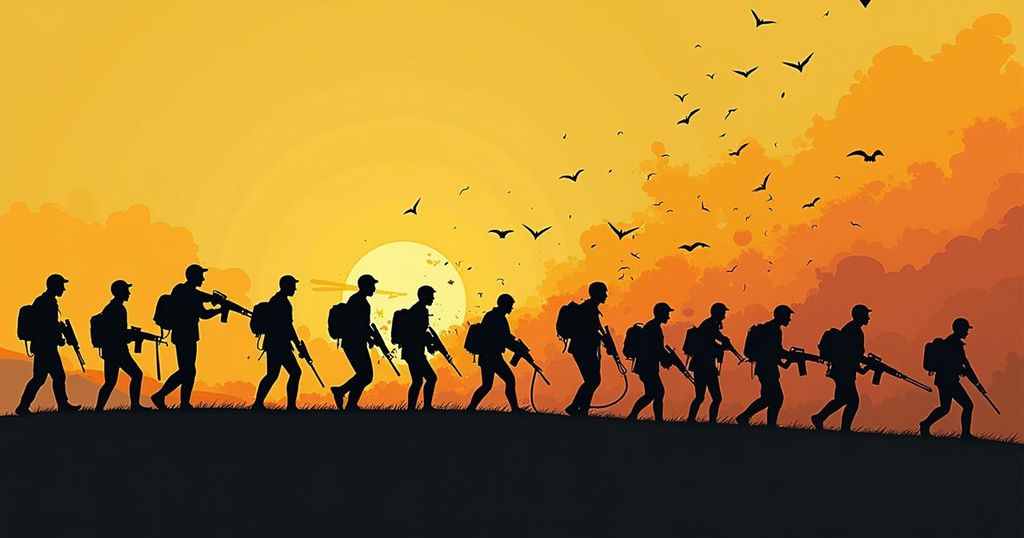The recent explosion of handheld pagers belonging to Hezbollah operatives highlights the escalation in the ongoing conflict between Hezbollah and Israel. The incident resulted in significant injuries and fatalities, with Hezbollah blaming Israel and promising retaliation. This conflict has historical precedents, rooted in Israel’s 1982 invasion of Lebanon, and has since evolved into a complex web of military engagements and retaliatory actions. The situation remains volatile, with serious implications for the region.
The recent explosion of handheld pagers belonging to Hezbollah operatives in Lebanon marks another significant event in the long-standing conflict between Hezbollah and Israel. On September 17, 2024, approximately 2,800 individuals were injured due to these detonations, resulting in at least eleven fatalities, including three civilians. Hezbollah has attributed blame for this incident to Israel and has vowed to take retaliatory measures. This conflict has escalated substantially since October 8, 2023, when Hezbollah began launching attacks across the Lebanese-Israeli border in response to Israel’s military actions in Gaza. These developments unfolded amid a broader context of violence, with the ongoing war in Gaza resulting in significant casualties on both sides, compounding tensions in the region. The Hezbollah-Israel conflict traces its origins to 1982, when Israel invaded Lebanon in response to cross-border attacks from the Palestine Liberation Organization (PLO). This incursion catalyzed the formation of Hezbollah, supported by Iran, as a Lebanese Shiite group intended to resist Israeli occupation. Over the decades, the group has emerged as a formidable military force, engaging in a series of confrontations with Israeli forces, including notable events such as the 2006 Lebanon War and sustained skirmishes leading up to the current hostilities. As tensions flared again in 2023, the death toll in Gaza mounted, prompting Hezbollah’s involvement in the conflict by executing a series of rocket attacks against Israel. In this period, significant numbers of civilians have been affected, with reports indicating that thousands of individuals have been displaced in both Lebanon and northern Israel. The past engagements between Hezbollah and Israel include various military operations and intensive exchanges of fire, reflecting a persistent cycle of violence and retaliation. Notably, Israel’s military strategy has involved targeted strikes aiming to neutralize Hezbollah’s leadership and capabilities, perpetuating the cycle of conflict. In summary, the relationship between Hezbollah and Israel remains fraught with tension and violence, underscored by a history of military engagements that began decades ago. The recent pager explosion incident adds yet another chapter to this protracted confrontation, underscoring the fragility of peace in the region and the potential for further escalation.
The conflict between Hezbollah and Israel has historical roots, predominantly tracing back to Israel’s invasion of Lebanon in 1982. Initially intended as a response to Palestinian attacks, the invasion led to the formation of Hezbollah, a Shiite militant group that emerged to combat Israeli forces. Over the years, numerous skirmishes and full-scale wars have escalated the conflict, with Hezbollah gaining significant military prowess and engaging in various strategic military operations. This ongoing violence has been further exacerbated by regional tensions and geopolitical dynamics involving various state and non-state actors.
The ramifications of the Hezbollah-Israel conflict continue to unfold, illustrating an intricate interplay of local grievances and broader geopolitical considerations. The recent pager attack serves as a harbinger of further military confrontations, as Hezbollah vows to retaliate against Israel, continuing the cycle of violence that has persisted for decades. The situation remains precarious, with potential implications not only for the immediate parties involved but also for regional stability and international relations.
Original Source: www.aljazeera.com







